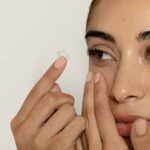Can You Take a Nap with Contacts In? What You Should Know

It’s nothing anyone should be criticized for because life happens. We’ve all experienced the stage where you feel so tired and a quick power nap is the best solution. Taking out your contacts at that moment feels like a big chore, which is understandable but not a good idea because it is still risky.
The Reason Explained
There should be a breathing space for your eyes. The cornea needs a good supply of oxygen to stay healthy and contact lenses restrict this to some point because they sit on your cornea, especially soft contact lenses.
You blink a lot when you are awake and it helps tears move oxygen around the lens, but when you nap with contacts, this becomes impossible and the oxygen supply reduces more and causes corneal hypoxia. This can cause problems because it’s like holding your breath for a long time until you faint or collapse.
Sleeping with your contacts can open doors to risk factor increments for eye health issues. It doesn’t stop with feeling uncomfortable; serious infection can occur and may lead to vision loss.
Possible Risks Attached
Eye Infections
Pink Eye
Pink eye, which is also known as conjunctivitis, can occur when your eyes don’t get enough oxygen and your tears don’t clean your eyes. The eyes become warm and moist, giving room for germs to grow. Usually, it is less severe but it can give you bloodshot eyes and irritate them, making them feel itchy and gritty.
Microbial Keratitis
Another serious issue is microbial keratitis that affects the cornea. The eye infection can be painful and lead to permanent scarring and cause blurred vision because the outer layer of the eye becomes inflamed.
Corneal Ulcers
These are open sores on your cornea and are often caused by eye infections. They look like white spots on the clear part of your eye, can be very painful, and can cause permanent damage to your vision if you don’t visit your eye doctor right away.
Corneal Hypoxia (Lack of Oxygen)
As explained earlier, the cornea swells and causes blurry vision. The blood vessels might start to grow into your cornea as they seek oxygen due to the deprivation when you sleep with contacts in. The end result is uncomfortable eyes and not getting clear vision.
Dry Eyes
Fewer tears are produced when you sleep with your contact in. Of course, dry eyes will set in and lead to discomfort, a gritty feeling, and eye irritation.
Corneal Abrasion
While napping with your contacts, they have the probability to stick to your eyes. Accidental tear can occur and scratch the cornea in the process of removing them, causing a corneal abrasion, which can be very painful.
Effect of Having Different Types of Contact Lenses on While Napping
Yes, there is a general rule of not sleeping in contact lenses but the effects are dependent on the type of contact lenses.
Daily Disposable Contact Lenses
They are strictly to be worn for one day and thrown away. You must not sleep or take a short nap in them because of the high risk of infection.
Monthly Lenses and Two-Week Lenses
They are to be removed daily after being worn before sleeping overnight or taking a short nap. These are mostly soft contact lenses and are not meant for continuous wear.
Extended Wear Contact Lenses
Only these ones are FDA approved for overnight wear because they are specifically designed for that. The special materials they are made of allow six to eight times more oxygen for your eyes. However, it doesn’t mean you should sleep in them.
For proper use, follow the eye doctor’s directions on how long you can safely wear them and when to change them, and that is, if you are a good candidate for the category.
Actions to Take If You Accidentally Sleep With Contacts In
The first step is not to panic. You shouldn’t rush to remove them because of dry eyes, so wait a few minutes for your eyes to rehydrate naturally. You can also speed up the rehydration process by applying some lubricating eye drops and blinking a few times.
Once you are done with this, gently remove the contacts and let your eyes breathe. You can wear glasses for the rest of the day for your eyes to get enough oxygen and recover. Inspect your eyes for any irritation, redness, blurry vision, eye pain, or light sensitivity. Contact your eye doctor immediately if they don’t go away because they could be visual problems indicating a serious infection.
General Habits to Practice As a Contact Lens Wearer
Following your eye doctor’s direction is the most important rule. Avoid sleeping in contact lenses as much as you can so make it a habit to keep your contact lens case and solution beside your bed or in your bag when going out.
For reusable lenses, clean and store them with fresh solution, and don’t forget to replace your contact lens case every three months. Lint-free towels are recommended for drying your washed hands before touching the contacts and don’t overwear your contact lenses. Stick to the replacement schedule as directed to avoid increased risks.
Even with your contacts, you need to have a backup pair of glasses for when your eyes feel irritated and need oxygen, because you need to give your eyes a break sometimes. Try as much as possible to avoid water contact with your lenses because of microbes that can promote eye infections. Visit your doctor regularly because if eye infections are left untreated, it can lead to permanent eye damage.
Conclusion
Yes, a short nap looks harmless but the risks should not be taken because your eye health is a big deal. The side effects are too scary to joke with. You also don’t want to subject your eyes to inconvenience so try your best to follow the rules for healthy eyes that have been laid out by the Centers for Disease Control and Prevention.
When you feel tired and realize you can accidentally nap, take your contacts out immediately and soak them in a fresh solution until you wake up. Don’t miss your eye exams and always carry out a full and thorough eye inspection after sleeping with contact lenses or wearing them for extended periods.
The goal is to enjoy a better life through contact lens wear. Do everything to make it possible.
Bibliography
https://www.contactlenses.co.uk/education/can-I-nap-with-contact-lenses-in
https://health.clevelandclinic.org/can-you-sleep-with-contacts-in
https://www.warbyparker.com/learn/sleeping-with-contacts








